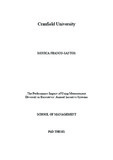JavaScript is disabled for your browser. Some features of this site may not work without it.
| dc.contributor.advisor | Bourne, Mike | |
| dc.contributor.author | Franco-Santos, Monica | |
| dc.date.accessioned | 2008-02-07T12:38:07Z | |
| dc.date.available | 2008-02-07T12:38:07Z | |
| dc.date.issued | 2007 | |
| dc.identifier.uri | http://hdl.handle.net/1826/2305 | |
| dc.description.abstract | The purpose of this research is twofold. Firstly, it examines the relationship between the use of financial and non-financial performance measures in executives’ annual incentive systems and firm performance. Secondly, it looks at the extent to which this relationship is influenced by five different organisational contingencies (business risk, ownership structure, organisational culture, the quality of the performance measures used in executives’ annual incentives and the effectiveness of the executives’ reward system). Agency theory and contingency theory are used to develop the theoretical framework that underpins this study. The research design is based on survey and archival data from 132 private and publicly quoted organisations based in the UK. Data is studied using multivariate analysis, in particular, multiple regression analysis with main and interaction effects. Contrary to expectations, the study finds that the relationship between the use of financial and non-financial performance measures in executives’ annual incentives and economic firm performance (measured by return on assets and sales annual growth) is negative rather than positive. However, this relationship is not universalistic. Results suggest that when organisations operate in high or low business risk environments or when organisations have clan or adhocracy cultural values the use of multi-criteria performance measures in executives’ annual incentives is beneficial as it facilitates the achievement of business goals. Results also suggest that ownership structure, the quality of performance measures and the effectiveness of executives’ reward systems are organisational contingencies that do not influence the performance impact of using multi-criteria performance measures in executives’ annual incentive systems. This thesis contributes to the management literature; in particular, to the literature that looks at the use of non-financial performance measures in management control systems. It contributes to agency-based research by providing empirical evidence that refutes some of its premises regarding the use of multi-criteria performance measures in incentive systems. This thesis also contributes to contingency-based research as it supports the notion that there is no universally appropriate management control system –in this case, the executive incentive system– which applies equally to all organisations in all circumstances. | en_UK |
| dc.language.iso | en | en_UK |
| dc.publisher | Cranfield University | en_UK |
| dc.rights | © Cranfield University, 2007. All rights reserved. No part of this publication may be reproduced without the written permission of the copyright holder. | en_UK |
| dc.title | The performance impact of using measurement diversity in executives’ annual incentive systems | en_UK |
| dc.type | Thesis or dissertation | en_UK |
| dc.type.qualificationlevel | Doctoral | en_UK |
| dc.type.qualificationname | PhD | en_UK |
